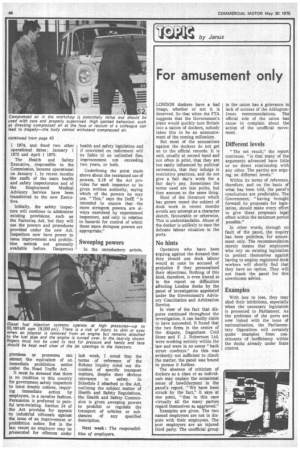For amusement only
Page 54

If you've noticed an error in this article please click here to report it so we can fix it.
LONDON dockers have a bad image, whether or not it is deserved. So that when the FTA suggests that the Government's plans would quickly turn Britain into a nation of dockers, nobody takes this to be an announcement of the coming millenium.
But most of the accusations against the dockers do not get on to the official records. It is said, usually at second hand and not often in print, that they are too easily influenced by political extremists, that they indulge in restrictive practices, and do not give a fair day's work for a fair day's pay. Sometimes the terms used are less polite, but they amount to the same thing.
Most of the literature which has grown round the subject of dock work in recent months avoids any attempt at a character sketch, favourable or otherwise. This is understandable. Abuse of the docker is unlikely to ease the delicate labour situation in the ports.
No hints
Operators who have been arguing against the demand that they should use dock labour would at once he accused of prejudice if they personalised their objections. Nothing of this kind, therefore, is even hinted at in the report on difficulties affecting London docks by the panel of investigation appointed under the Government's Advisory Conciliation and Arbitration Service.
In view of the fact that disputes continued throughout the investigation, it can hardly claim to have succeeded. It found that the two firms in the centre of the dispute, Dagenham Cold Store and F. J. Robertson Ltd, were working entirely within the law and were in no sense "back street cowboys." As this was evidently not sufficient to clinch the matter, the panel was bound to pursue it further.
The absence of criticism of dockers as a class or as individuals may explain the occasional sense of bewilderment in the panel's report. "We have been struck by the fact," it says at one point, "that in this case virtually all the many parties regard themselves as aggrieved."
Examples are given. The two named employers are not in dispute with their employees. The port employers are an injured third party. The unofficial group in the union has a grievance in lack of success of the AldingtonJones recommendations. The official side of the union has cause to complain about the action of the unofficial movement.
Different levels
"The net result," the report continues, "is that many of the arguments advanced have little or no direct relationship with any other. The parties are arguing on different levels."
Within its terms of reference, therefore, and on the basis of what has been told, the panel's conclusions are predictable. The Government, "having brought forward its proposals for legislation, should make every effort to give these proposals legal effect within the minimum period possible."
In other words, through no fault of the panel, the inquiry has been pointless, for amusement only. The recommendation merely means that employers who rely on existing legislation to protect themselves against having to employ registered dock workers will shortly find that they have no option. They will not thank the panel for this unwelcome advice.
Examples
With less to lose, they may shed their inhibitions, especially when the necessary legislation is presented to Parliament. As the problems of the ports are now linked with the issue of nationalisation, the Parliamentary Opposition will certainly quote examples from constituents of inefficiency within the docks already under State control.




























































































